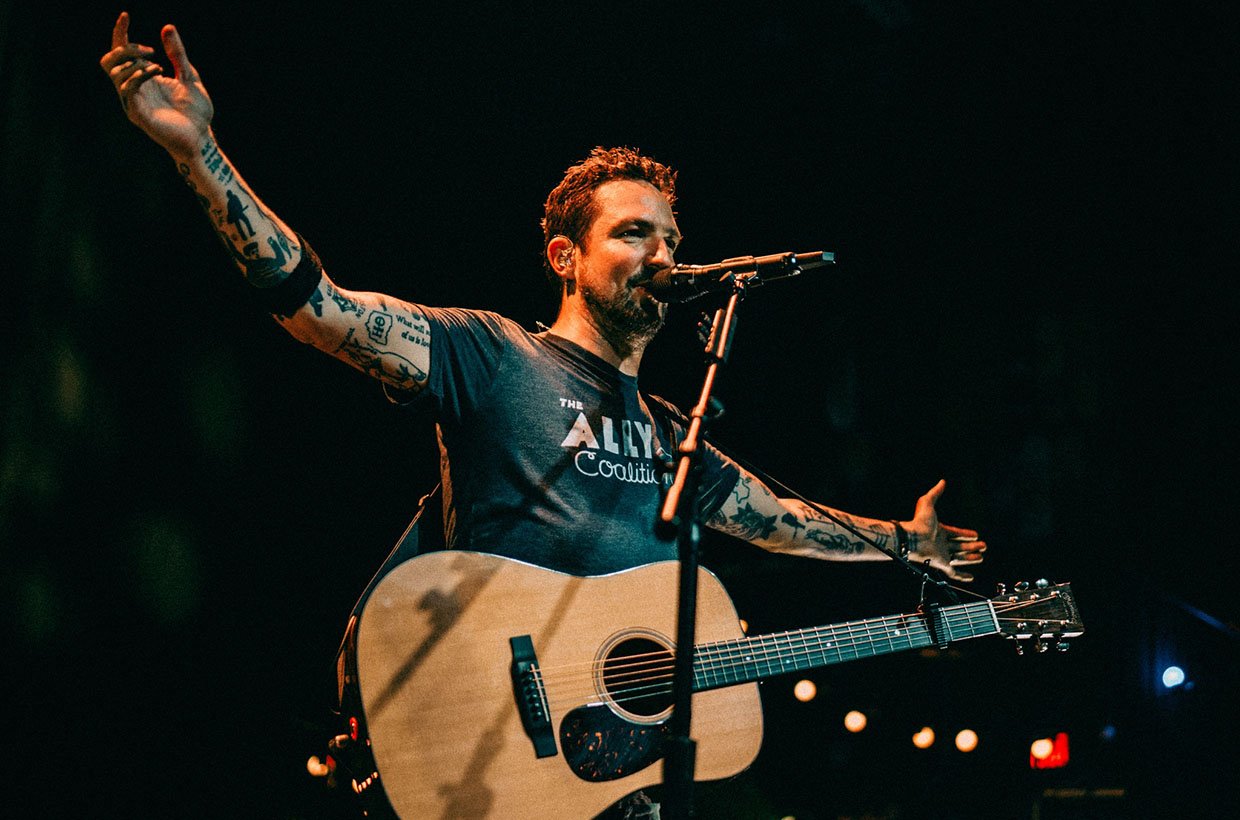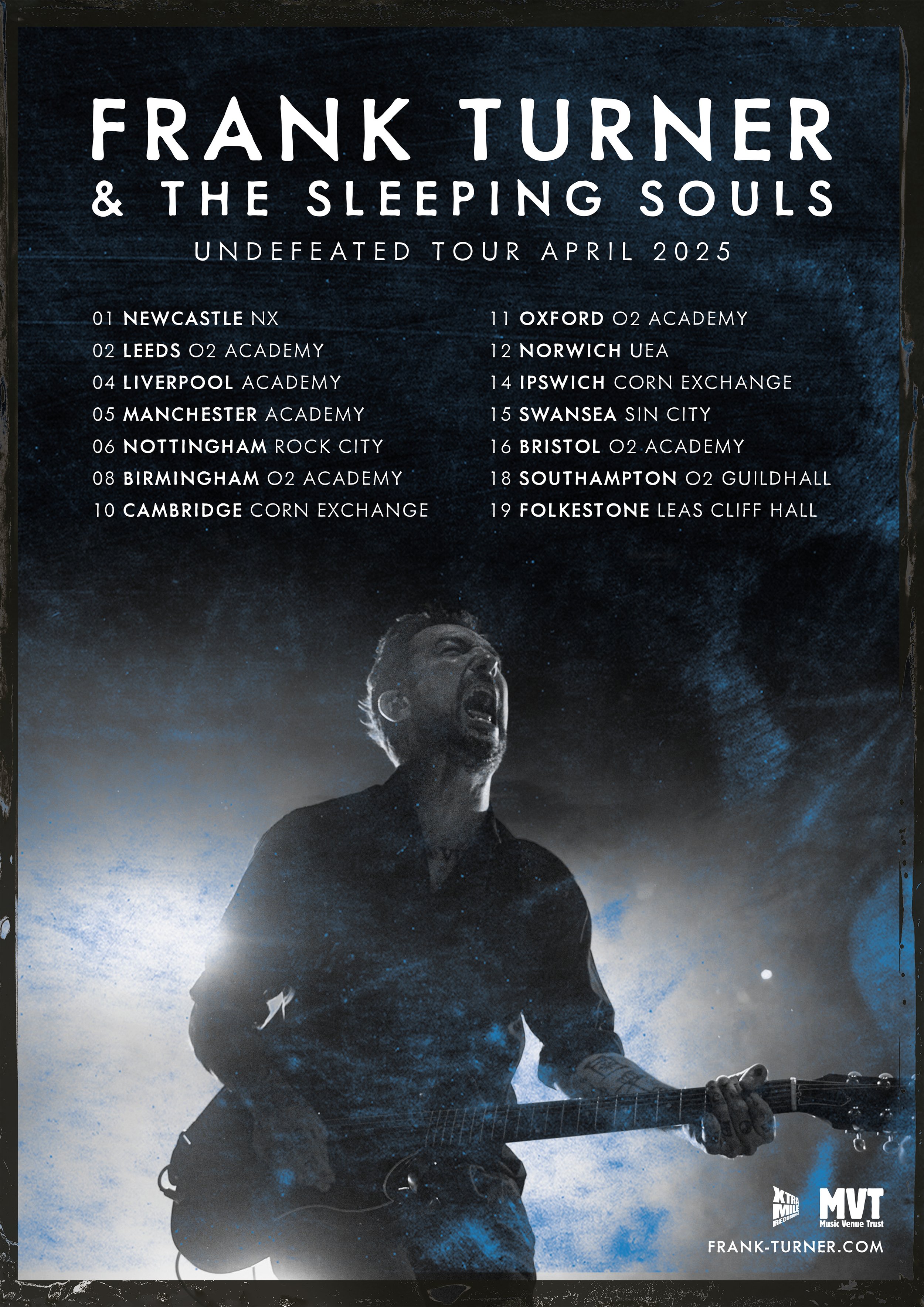Frank Turner’s touring history is nothing short of astonishing.
With his 3,000th show set to take place at Alexandra Palace on the 22nd February, he’s performed in an incredible variety of venues - from the tiniest pubs to the Olympic Opening Ceremony. Despite reaching such a monumental milestone, Turner’s commitment to small venues has always remained at the heart of his career. These intimate spaces are where his journey began, and they’ve always been central to his ethos as an artist. He was awarded Music Venue Trust’s Outstanding Achievement Award in 2020 in recognition of his long-standing support of the organization, and recently announced a new partnership with MVT, pledging to donate £1 from every ticket sold throughout his 2025 UK tour to help sustain local, independent venues.
In May 2024, Turner smashed the world record for the most number of gigs played in 24 hours, performing 15 shows in 15 different towns kicking off in Liverpool. “Every show was an independent venue sponsored by the Music Venue Trust, and it was a cool way of directing money and attention towards that sector, which is important to me,” he said, beating the previous record-holder Hunter Hayes, donating a share of all funds raised to MVT.
In October last year, Turner confirmed that his former band Million Dead would reunite for a series of live shows throughout 2025, 20 years after their split. One fan in the comments section wrote “This is bigger than Oasis.” We at Sherwood happen to agree. Unlike a turgid Liam Gallagher performance, Million Dead live shows were a raw, unrelenting spectacle that fans still reminisce about to this day. Their brief but impactful legacy saw the band become a cornerstone of the UK post-hardcore scene, laying the groundwork for Turner’s epic solo career.
Since stepping out as a solo artist in 2005, Frank Turner has released 10 studio albums, with 6 making the UK Top 3, each record brimming with folk-punk energy and introspective poignancy. He’s as comfortable playing to a packed out Wembley Arena as he is in the back room of a pub, but it’s his commitment to the spaces that make it all possible that makes him a star in our eyes.
With that in mind, we asked Frank about the importance of small venues, the role they’ve played in his career, and what can be done to ensure they remain a cornerstone of our world for years to come.
So Million Dead are going on tour in 2025. Is this just an excuse to play small, sweaty, intimate venues again? What size capacity venues are you looking at for these shows?
I’d say it’s more an excuse to get back together with some old friends and rediscover some old chemistry, which surprised us all by still being there when we first got in a room together. The choice of venue capacities is kind of interesting actually - no one really knows how many people want to come see MD. I guess we’ll find out. This is very much a one-and-done type of thing, it should be noted, no new albums or anything.
What role did small venues like Nambucca play in shaping your career, and how would your journey be without them?
Small independent venues were completely essential for the start of my career, perhaps even the majority of it. Nambucca in particular gave me a place to sleep and a gang of people to learn and scheme with, but there are many similar places around the UK (and indeed the world) that provided space for me to make noise, find my voice, find an audience, and develop as a performer.
What were some of your favourite small venues to play in your early days?
There are many to mention. The Joiners in Southampton, the Brudenell in Leeds, the Cavern in Exeter, Cluny’s in Newcastle, the Boilerroom in Guildford, Nice N Sleazy’s in Glasgow, Clwb Ifor Bach in Cardiff, Whelan’s in Dublin... if I keep going out geographically I will never get around to sending this email.
The Music Venue Trust reports that grassroots music venues are closing at a rate of 2 a week. From your perspective, how has the landscape changed since you were starting out?
I think things are broadly harder, which is partly to do with rising costs and taxes and such, and partly due to something of a cultural change; a lot of younger people are less engaged with underground live music right now, which I think has something to do with the pandemic, and something to do with those living costs. It’s never been especially easy or glorious to run a small venue, but I suspect it’s harder now than it used to be. I certainly have seen a fair few spaces I loved fall by the wayside, which is always tragic.
Do you think the rate of small venue closures is due to government negligence and over taxation, or Netflix, YouTube and other distractions dragging audiences away from live music?
As mentioned, it’s a combination of all these things. The economics of underground music and touring are really rough right now. But also a lot of people are staying in, or regard live music as something that consists of one show a year that costs £300 and is in an arena or stadium. There’s a place for those shows but it’s not the whole deal, and spreading the word about that seems like an important thing to try and do right now. Go see local bands.
Do you still get out to see smaller shows? Can you hype some artists who’ve impressed you live recently?
I do when I can, yes. Ben Brown, Rad Pitt, Wyse, The Shackletons, Gen & The Degenerates, The Meffs... there’s a lot of great music around right now, a lot of fresh punk rock.
Would you support a Spotify boycott if enough artists agreed to it?
I’m not sure I’d see the point to be honest. If you get rid of Spotify you likely end up with something very, very similar in its place. You can’t un-invent streaming technology. Of course parts of the system could be run better/more equitably, but if you lost the ubiquity of the platform that would harm everyone apart from the artists at the top of the tree.
Do you think it’s harder to make the leap from pubs to bigger venues to arenas than it used to be?
I’m not sure really; I’m probably the wrong person to ask. I mean, it wasn’t exactly easy for me. But I’m not at the coal face of the grassroots (mixed metaphor alert) any more, and I wouldn’t want to speak out of turn about that.
You’ve been doing touring pretty much non-stop for 2 decades now. Have you noticed any changes in audience behaviour as our smartphone addictions worsen?
That’s an interesting question. I wouldn’t say I hate smart phones at shows, I’d just say it’s kind of lame, and self-condemnatory. If you waste your evening out staring at a small screen, more fool you. My audience has changed, shifted, grown, moved, all that, but I’m not sure smart phones are the biggest driver of those changes.
If you could wave a magic wand and fix one systemic issue about the British music industry, what would it be?
Ha, another good question. There are a lot of systemic issues, particularly with misaligned incentives between business and art, and I get worked up about people’s short-term taste and disposability, but at some point you’re just moaning that people are people I guess.


